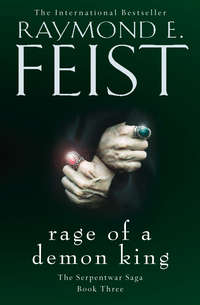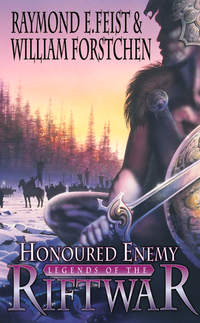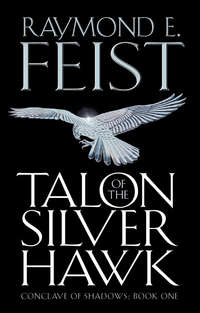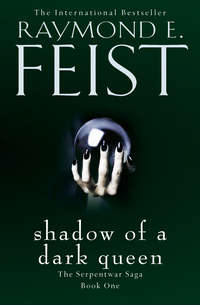
Полная версия
The Chaoswar Saga: A Kingdom Besieged, A Crown Imperilled, Magician’s End
‘I do not know, Child. It appears to keep growing no matter what is done; fire, steel, magic have been brought against it, yet it happily embraces whatever it touches. A sharpened steel arrow, a falling shard of masonry, the cowering figure of a child, all are welcomed to oblivion by its touch. It is relentless, but unhurried.’ He paused and calculated. ‘I judge a few years, maybe five.’
‘But it will come?’
‘If we have learned anything of the Darkness it is that it is inevitable.’
‘Then we can not stop,’ she said. ‘If we travel for another five years, then in ten it will overtake us. Nothing can stop it.’
‘Everything the Darkness touches it dissolves, and even the stones scream in pain as they are rendered into nothing, yet the Darkness itself is silent, making no sound whatever. It is without substance, yet it consumes all. Yet no matter how much it consumes, it remains without substance. Nothing appeases it, nothing stops it. It just is.’
‘What do you think it wants?’ asked Child, still staring into the distance.
‘I can not pretend to know,’ said the old teacher with a sigh. ‘It is something of a speculation in itself that the Darkness may even be capable of wanting, which would require awareness. Does the wind want anything? Or the rain that falls? Or the fire that burns? Does the sand want as we tread upon it?’
Fixing Belog with a strange expression, Child said, ‘The wind wants balance, the rain wants to seep as far down as possible, and the fire wants to breathe and grow’ Then she smiled a tiny smile and added, ‘I must confess I have no idea what the sand wants.’
He was silent for a long while as he considered her words, then said, ‘Yet those are mere explanations of their nature and their reason for existence, not any concession to will and consciousness.’
‘Perhaps,’ she said with a shrug. ‘I will not be here when the Darkness arrives, no matter how far I must travel.’
‘Where will you go?’ asked Belog.
‘Tell me of Datum’s war on Maarg in the mortal realm,’ she demanded.
He was surprised by the question, and a little annoyed that she had ignored his. Yet it was clear it was time to start moving again, heading into the now-ravaged former Kingdom of Maarg, looking for only she knew what, and along the way he would be expected to educate and, to a lesser degree, entertain her. And Child would hunt for and feed him.
As existences went, outside the comfort of working on behalf of the King with the other archivists, this wasn’t a particularly unpleasant one, save for all the walking, he amended silently.
As they continued, he told of the summoning of all the King’s forces, how his army was marshalled and every magic at his disposal was used to transport them to a world in the mortal realm, where the armies of Maarg, along with Sebran, Chatak, and other kings of the Second Kingdoms as well as chieftains and warlords of the Savage Lands had been fighting with a race known as the Star Elves. They were physically weak, mortal beings, but they had been cunning and used powerful magic effectively. Their soldiers could not stand against the combined might of five demon armies, but each demon had faced a dozen swords, and the demon legion had paid a price for their victories. More than a million demons had been returned to the breeding crèches, it was estimated, and had the demons been mortal, the war would have been over. But each time a demon died, it returned to the world of its birth, and quickly it was fed and nurtured to fighting strength, then returned to the struggle.
Then Dahun had struck, when Maarg’s force had inexplicably turned on their own allies, then Dahun had descended on the remnants, and in the end had fought his way across the mortal realm.
Then nothing more had been heard from the great Demon King or his generals. His army and all his retainers had vanished, as if they had never lived.
And Dahun’s kingdom had been left to defend itself against the Darkness.
She began asking questions, and he attempted to answer them as best he could.
‘Why are all rulers male?’ she asked at one point.
‘They aren’t. All kings are male. Female rulers are called queens.’
She nodded, and said nothing and they went on their way, leaving behind a horror even two demons could not understand.
• CHAPTER EIGHT •
Sailor
THE STORM ROILED.
The Suja slammed through heavy combers as it rounded the headlands before making the long run into Caralyan Bay. The crew had proven as ignorant as Jim expected, dock dregs hired at the last minute against the presence of someone such as himself, a Kingdom spy. All they knew was that every ship in Kesh seemed to have been gathered at Hansulé and all of them needed able-bodied sailors.
Jim knew where the ship was by the simple expedient of being able to calculate speed and position in his head. It had been something of a surprise when he had overheard an officer ask the captain where they were headed and he had discovered they were bound for Caralyan and not the deep-water harbour at Elarial.
Still, at the moment, Jim was too busy keeping a grip on wet sheets while reefing sails to wonder about the logic behind that choice. It was the dead of night and the only way Jim and the other men aloft could find their way around the rigging was by the light of a single shuttered oil lantern on each mast and by touch. The ropes were rough enough that he could keep a grip on them with his toes and haul in canvas. But it was the most dangerous task a sailor had to face, working aloft in a gale at night.
Jim was certain that when the storm broke several ships would be lost along the way. The storm had blown for over a day now, and the only good of it was that they would reach their destination two days ahead of schedule.
Jim lashed the sails furiously and then made his way to the relative safety of the mast. There he clambered down to the top of the shroud and from there scampered down to the deck. The captain was apparently happy with the timing of things, since the storm seemed to be lessening and he would run for another hour on those sails left up.
Jim made his way below to the relative dryness and warmth of the crew deck. The deck was almost empty as most of the watch was still aloft. Jim went to the hammock he had claimed when he had first gone below and ran his hand absently over the edge closest to the ship’s bulkhead. A satisfying lump greeted his passing touch: his concealed transport orb snuggled away in the fabric where the support rope was sewn into place. He threw himself into the canvas, content to dry off as best he could in the cold, damp air. There had been a supply of rough linen rags to dry off with when the storm began, but they were now in a heap by the companionway, soaked and probably growing a heroic infection of mildew, Jim thought. Still, what he would give for one hot dry towel right now.
On the other hand, he could still be aloft. He didn’t have to feign fatigue. He knew two or three others would come stumbling below in minutes as more top-riggers were sent below. He wanted them to find a soundly sleeping sailor, not someone to engage in idle chatter. Had they any information worth gleaning, he’d have been happy to be gossiping like a woman at market, but as he knew as much about this voyage as they did, he’d rather sleep.
Of all the roles Jim had undertaken during his career, he despised being a sailor above all others. He’d rather wrangle angry camels across the summer heat of the Jal-Pur Desert or fight his way out of a bandit fortress than spend one more night aboard this ship.
Yet duty called. He had to know what this fleet was about, for while he lacked specificity, he had no doubt whatever the truth turned out to be it was ill news for the Kingdom. As he let sleep take him, he wondered not for the first time what role the Pantathian Serpent Priests had in all this.
Sleep was brief as the order for all hands on deck came at dawn. Jim arose amid the usual grumbling of the men, adding a brief invective directed towards whatever lunatic had decreed this expedition, in keeping with his character, then headed up on deck.
Rather than be sent aloft to unfurl sails, he was directed towards the bow where a gang manned the capstan that lowered the anchor. It was a grey dawn, but the storm had blown out, leaving them on a choppy sea of slate and metallic green, under a hazy sky. But what had Jim’s attention was that they were being directed towards a spot near shore, where the ship would drop anchor.
As he expected, those not aloft already were told to man the lee side and watch for rocks. He went to the railing and glanced over, seeing nothing but deep choppy water and the occasional foam cap. He glanced towards shore and saw they were less than a quarter of a mile off the breakers. He calculated they were still a half-day’s sail from the city, and wondered just how many ships had already arrived.
As the dawn grew lighter and the weather became more clement, he got his answer: more ships than he had dreamed possible. As if to endorse his worst fear a squadron of Brijaner longships hove into view, moving to a location somehow communicated to them by whoever was in charge of this impossible fleet.
Glancing around to ensure no one was watching, Jim scrambled up a shroud to the mainmast, then quickly climbed to the top spar and looked towards the distant port. They were still far enough away that there was no sign of land where he knew the city would be. They were anchored in a vast curving bay, only serving as decent harbourage up in the top of the arch, where the mass of land to the north sheltered it from the worst weather coming in from the north-west. At least now Jim understood why they were here instead of up at Elarial. This many ships would clog even the vast entrance to that harbour.
Then another certainty struck him: Kaseem abu Hazara-Khan must have spotted his agents in Caralyan and was having them shadowed. No ship in this flotilla would be close enough to the city to be observed, unless by magic, or by one of Jim’s agents hiring a boat for a lovely day’s sailing.
With a sinking feeling in the pit of his stomach, he slithered down a sheet and dropped nimbly to the deck. He had wondered why all his agents south of here had gone silent, and those from here and to the north were untouched. Now he realized that Hazara-Khan didn’t care. Whatever he was planning, it would be in full play before word of this massive fleet reached the Kingdom.
Jim knew two things: he had to find out where this massive navy was heading, the Far Coast or Krondor; then he had to get off this ship and return to Krondor. He calculated. Logic dictated that the Empire of Great Kesh was going to attempt to reclaim all the land lost hundreds of years ago in one crushing assault. If those Brijaner longships were the first through the Straits of Darkness and could provide a screen against Quegan raiders, the rest of this fleet could make straight along the southern coast of the Bitter Sea and a three-pronged assault on Land’s End, Port Vykor, and Krondor could be undertaken.
Calvary could be on its way north from the Keshian cities of Jonril and Nar Ayab to come at the Vale of Dreams from the south-east, while the garrison of Durbin would be in support of the Keshian forces already in Shamata. Kesh would control the Vale within a week: Land’s End would fall in days, and if the King’s Western Fleet was caught at anchor at Port Vykor, Kesh would control the Bitter Sea.
If he were conducting this assault he would set a blockade of Krondor and then a raid up to Sarth, ensuring that help from Yabon would not be forthcoming. The forces on the Far Coast would be insignificant and if brought east through the passes in the Grey Towers, they’d be backed up behind those forces from Yabon halted north of Sarth.
Then Jim stopped. The only part of this that made no sense whatsoever is what Hazara-Khan would do in the South. He did not need to see the Keshian general’s orders and plans to know that every garrison south of the Overn Deep had been marshalled and was now aboard these ships. By conventional logic, hordes of very angry tribesmen should be pouring though the Girdle of Kesh into the lush farmlands of the Southern Empire.
Is this where the Pantathians played a part? he wondered. For something had to convince them to keep the peace without the heel of Kesh’s boot on their necks.
Suddenly Jim was as near panic as he was inclined to get. He had discovered everything possible to discover on this ship, but getting off was problematic. He could use his secret orb to return to his office in Krondor, which was his plan as soon as he knew more. The problem was in learning more. He was anchored near enough off the coast that swimming through the breakers to reach the beach was not a terrible danger. But once on the coast, then what? He would have more than twenty miles on foot before he reached any portion of the bay that would give him any more useful information, or faster transportation, and he would still have no idea what the plan was. There had to be another way.
He moved without thought at the order of the first mate, to start smartening up some lines and cleaning the decks. That meant the captain planned on staying a while. Jim resisted an urge to vent his frustration vocally and instead settled for a repeat of the same thought: there had to be another way.
Two uneventful days went by, which didn’t mean Jim had time to dwell upon his current position; a ship at sea, even one at anchor, required a great deal of attention, and as the Suja was short-handed – as apparently was every other vessel in the fleet – watches were half-day on, half-day off, though the ‘off’ was a matter of definition. After meals on the crew deck, there were sails to mend, ropes to splice, as well as wandering through the guts of the ship with a lantern investigating leaks, and ensuring the storm hadn’t damaged the masts or the keelson. Jim elected to do the hull inspection, hoping to find some cargo or other indication of what this ship’s role was to be, but he was frustrated to the point of madness in discovering the hold was empty. There was cargo on deck, he knew, crates brought aboard by the Pantathians, but they were lashed down under heavy canvas and there was always someone on deck; he stood no chance of being able to investigate the contents.
The third morning, ships began to weigh anchor, the Brijaner longships among the first. Jim took a deep breath to still his impatience; they were the logical first-strike flotilla, as they could outmanoeuvre any Quegan galley in the Bitter Sea, and would most likely run a screen so that heavier Keshian war galleys could come in behind and strike straight for Port Vykor.
More than once Jim itched to grab his teleportation orb and get to Krondor, but he knew he was at the point at which the warning he would bring would be scant days before Kingdom picket ships west of Land’s End caught sight of the foreign sails. A week’s extra preparation would mean little against this onslaught.
Then came the order for the Suja to raise anchor and lower sails. But the trim was for manoeuvring, and the order was to make way towards the city of Caralyan, not head out to sea. Jim got aloft with the top gang and unfurled sails and then got busy trimming them. They were sailing a close reach into a turn that would put a following breeze behind them as the wind was from the south this day, and it would be easy to pick up too much speed if the captain wanted a slow approach. Given the clutter of ships ahead, Jim was certain the captain wanted a very slow, cautious approach. As they neared the harbour, Jim could scarcely believe his eyes, for there were still more than a hundred ships standing off, as cargo barges and small service boats ran back and forth from land; they were not just coming out of the harbour itself, but from along the beaches beyond.
The order was given to drop anchor and reef sails, every man stood to, and the ship came to rest less than a quarter of a mile from a long beach. In the distance he could make out the smudge on the horizon he knew was the city of Caralyan, or at least the smoke from its chimneys. He had never cared for this city, finding it a second-rate port and rarely worth watching, but he had an agent there, anyway.
A longboat came towards the ship, and the first mate shouted orders to get cargo nets ready. Jim manned the boom with two other men and another half a dozen sailors pushed aside the main hatchway, and scrambled below to receive cargo.
The net was lowered and Jim waited on the hoist until the signal was given. He and two other men turned the heavy crank and the winch turned as the net rose into view.
Jim almost let go as a very disturbed-looking cow stared at him. There was another one snug in a sling beside the first, and it was lowing piteously. Jim was no expert on animal husbandry but he had travelled through enough farmland to recognize dairy cattle.
Livestock keeps longer than slaughtered meat, so bringing cattle, sheep or even pigs, which are notoriously hard to herd, along behind an army was not unheard of, especially if good hunting wasn’t anticipated. But dairy cattle?
Then his eyes widened even more as men, women, and children climbed aboard and suddenly Jim understood exactly what was going on. He glanced around to see that everyone else was intent on their job and started gauging when he might get away to his hammock and activate his transport orb; for he now knew exactly what some insane group of Keshian nobles had decided to do.
This wasn’t a mere military adventure. It was more than just an all-out assault on the Western Realm of the Kingdom of the Isles, or even a bid to claim all of the Vale of Dreams after years of border skirmishes.
Before him were men and women from half a dozen dissimilar places: desert people from Dahali-Kapur, swamp-dwellers from the Dragon Mere and E’Ramere, Ashunta horsemen, and Isalani famers, all from the Keshian Confederation.
Kesh wasn’t guarding its borders from the Confederates desperate for better land in the Southern Empire. The Empire was bringing Confederates to the Far Coast and meant to give them Kingdom land.
This wasn’t just another war; it was a wholesale invasion and colonization. They didn’t intend to conquer those lands and rule a fractious population, they were going to displace that population with people who would gratefully obey Imperial law so they could hold on to their new, treasured homes.
Jim glanced around and saw more ships unfurling sails to begin their voyage to the north. Without knowing the exact number of ships he could only estimate, but at the very least the Empire of Great Kesh was bringing over twenty thousand famers, herdsmen, and craftsmen to the Far Coast, roughly three times the entire population of Kingdom citizens. And the majority of fighting-age men had been mustered and were probably now half-way to Krondor. Jim fought the sense of nausea that rose in his gullet.
Jim watched as the last of the ‘cargo’ came aboard. The men among the colonists had moved into like groups, keeping as much distance away from traditional enemies as the confined space below permitted.
He was climbing rigging behind the poop deck when he heard the captain shout, ‘We’re ready. Stand by to weigh anchor!’
Glancing around, Jim saw something over by the next ship that made him pause. As more and more colonists had been boarding the ships, he had considered how Great Kesh was going to seize the Far Coast. It had been a question he could not answer beyond some vague concept of a massive advantage in numbers.
Compared to the Confederacy, the Far Coast was teeming with riches. But it was still sparsely populated after over a hundred and fifty years. Two huge wars in the last hundred years had devastated the Western Realm, and the population had been low to begin with. The only city of any size was Carse, though Crydee was still capital of the Duchy, and those population centres, along with Tulan in the south, were relatively stable, having grown by barely more than a tenth since the invasion of the West by the army of the Emerald Queen.
He could see why Kesh might want to reclaim the Far Coast after all these years; moving a large portion of the population of the Confederacy made sense. It would pacify a large portion of the rebellious Confederates by thinning out the population and reducing the competition for precious natural resources among those who remained. And it would quickly establish a thriving colony on the Far Coast that could exploit the region far more efficiently than the Kingdom had heretofore, providing a quickly profitable revenue source, but still keeping taxes low for those new colonists.
Jim almost admired the audacity of the plan, the sheer scope of it. What a stunning triumph it would be for whatever faction of generals and nobles in the Gallery of Lords and Masters were behind this! But then his admiration fell short when he considered it was his kingdom that was being carved up to make this dream a reality.
What he saw on the next ship suddenly brought the entire plan together. Slavers. The next ship was boarding a party of at least fifty members of Kesh’s Slavers’ Guild.
Outlawed in the Kingdom for nearly two centuries, slavery was still an institution in Kesh. More than one Keshian slave had died trying to reach safety in the Kingdom, but few could get across the frontier.
The sick feeling returned to the pit of Jim’s stomach. Now he knew how Kesh’s invading colonists would deal with those they displaced. He had imagined them being run up into the hills to find their way to the East and the haven of Yabon, or the Free Cities, or perhaps seeking sanctuary with the dwarves or the elves up in Elvandar.
Two problems solved at once, thought Jim as he started back down the ropes, as if he had an important task besides scuttling up to the yards and unfurling sails. First the villagers and townspeople would not have to be considered as a potential liability; boys displaced from their homes would not grow up to be outlaws and bandits in the woodlands and forests of the Far Coast, and some of the expense of this massive invasion would be underwritten by a vast influx of new bodies for the trading blocs in every city in the Empire.
For one brief second Jim felt overwhelmed. Who could have devised this insane plan, one so overreaching that it might even work? No one he knew among the rulers of Great Kesh hated the Kingdom enough or was covetous enough to …
Then it hit him. There was one common weakness shared by both the Kingdom of the Isles and the Empire of Great Kesh; both were currently ruled by unsure men with no apparent heirs. With the crown in play, a great many political promises could be made irrespective of the likelihood of those promises being kept. When the conditions of a promise were, ‘When I gain the crown …’ those involved knew both the price of failure and the scope of the riches that might be attached to success.
Jim hit the deck and scampered below, heading straight for his bunk. He found his tiny sphere and quickly removed it from the fabric of his hammock. He slid the tiny lever that enabled him to select one of three destinations and then the second lever to active it.
Nothing happened.
Jim barely contained a primitive scream of frustration as he repeatedly tried the device on all of its settings. It had simply stopped working. He knew the Tsurani devices were old, and many had failed, but he had taken the one he judged most likely to work at need and had guessed wrong. He was so caught up in this unexpected change in his plans that he was unaware of the man coming up behind him until the last possible instant. Jim spun and crouched, ready to fight for his life. But he was an instant too late. As a club struck him on the side of the head, a blinding explosion of light was followed by blackness.
Jim’s head pounded as if he had been on a seven-day drinking spree and his jaw throbbed. He blinked as he opened his eyes and tried to focus.








